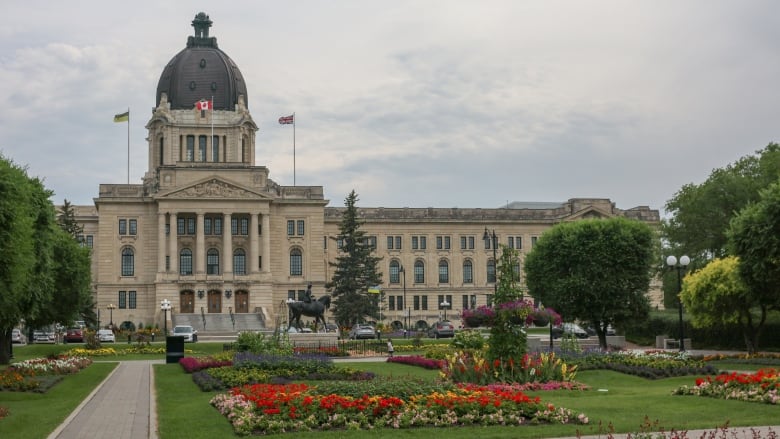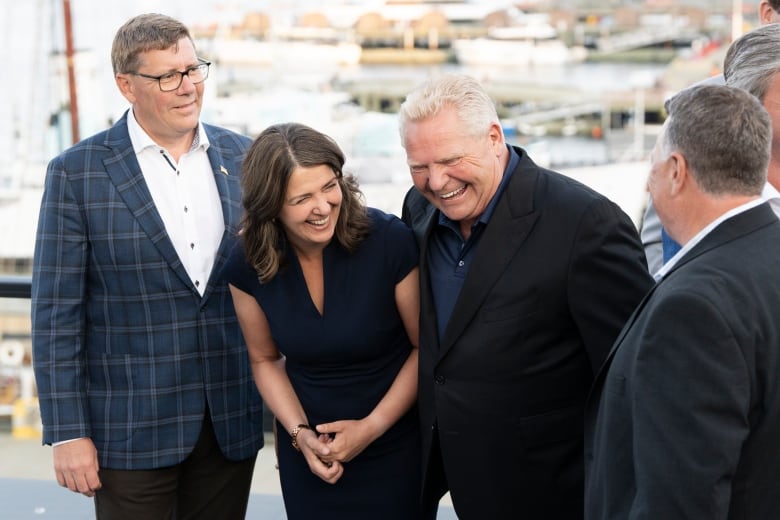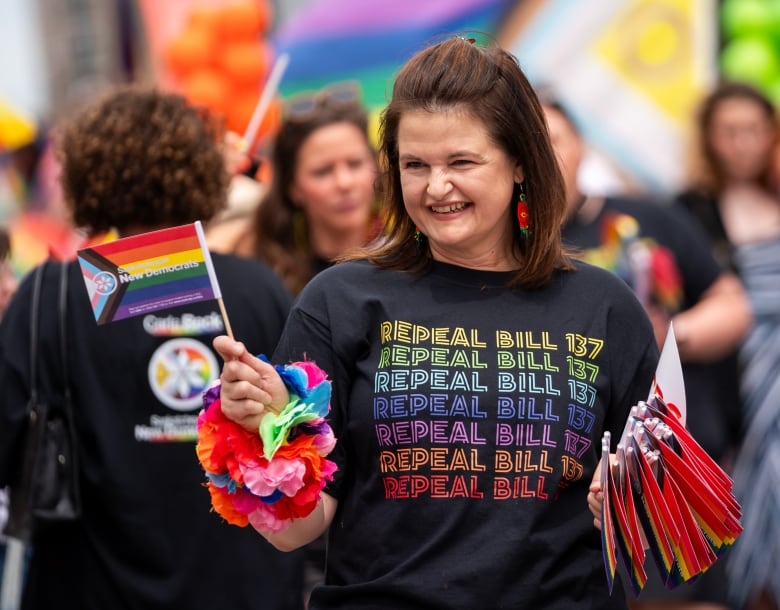Saskatchewan's political parties jockey for position on shifting spectrum
Sask. Party facing challenge on the right, NDP trying to take up centre

A Saskatchewan election campaign is days away, and the province's candidates and parties are jockeying for positions on an always-evolving political spectrum, workingto define what they are and where their opponents stand.
Last week, Premier Scott Moe spoke about how he and his party have been labelled in recent months.
"I've been called a Liberal, too far to the left, and I've been called an extreme right," Moe said.
Moe was asked about criticism by two former Saskatchewan Party MLAs, Denis Allchurch and Greg Brkich,who were announced as candidates for the Saskatchewan United Party last week.
Moe beat Allchurch in a contested nomination battle for Rosthern-Shellbrook in 2011.
In a news release, the Sask. United Party said Allchurch put his name forward because he "believes the province needs new, true conservative leadership."
Moe downplayed the impact of the announcement.
"There are two parties that can ultimately form government in this province, and that's the Saskatchewan Party and the NDP," he said."You can vote for the NDP party directly, or indirectly by splitting the vote on the right."
He referenced the 2015 Alberta provincial election, when the Progressive Conservative Party and Wildrose received 28 and 24 per cent respectively, while the NDP received just over 40 per cent and formed government.
"So if you think you're going to outsmart vote-splitting, history proves you wrong," Moe said.
University of Calgary political science professor Lisa Young said the "vote-split" concern fromMoe is "a cautionary tale for conservative premiers in these two provinces."
"It certainly is a pressure that you see conservative politicians being quite worried about. And there's always this dilemma of trying to hold on to those centrist voters who might potentially switch to the NDP, especially in urban areas."
Young said conservative parties want to "hold that right flank, and not end up in that situation where there is vote splitting and potentially the NDP can come up the left side and win seats unexpectedly."
Sask. Party's challengers on the right
The Opposition NDP has accused the Saskatchewan Party government of moving too far right under Moe.
One example came last October, when Regina NDP MLA Aleana Young said the government's emergency passage of Bill 137 was taking its cues from the "far right side of the fringe." The bill requires parental consent before a child under 16 can use a different gender-related name or pronoun at school.
A byelectionin Lumsden-Morse preceded the introduction of the bill. The Saskatchewan Party won the seat, butthe Sask. United Party finished second. Its current Leader Jon Hromek campaigned on parents' rights issues related to items included in the bill.

Daniel Westlake, a political scientist at the University of Saskatchewan,said its common for parties to shift on certain issues in response tothreats from other parties.
The Saskatchewan United Party is making its first foray into a general election.
"I expect to see the Sask. Party shift to the right a bit to cover off this Sask. United Party and a threat they pose on their right,[but] I'm not expecting a huge surge in Sask United support. I don't think we've seen much evidence of that yet."
Sask. United will face competition for votes on the right from the Buffalo Party in some constituencies.
The Buffalo Party debuted with four second-place finishes in the 2020 provincial election.
University of Regina professor of politics and international studies Tom McIntosh said the Saskatchewan Party may be fighting a campaign on two flanks for the first time.
"It creates a potential for the Sask. Party to be sort of bifurcated in its messaging: trying to reassure those centre voters, stick with us, don't flip over to the NDP, which has clearly moved to the centre, if not even past the centre on some things while also dealing with this rather noisy distraction on their right flank," he said.
"That could discombobulate the the Sask. Party campaign if they don't handle it well."
Westlake saidsimilar situations havepopped up recently elsewhere in Canada and in Europe.
"Centre-right parties do tend to get scared that they're going to lose voters on their right to further-right parties that emerge."
Westlake said a breakthrough by a third party is rare, withthe Wildrose-PC gradual alliance in Alberta being a notable exception.
Is Carla Beck's NDP moving more to the centre?
The carbon taxhas dominated Saskatchewan politics since its inception and the "pre-campaign" has been no different.
NDP Leader Carla Beck has gone on the record numerous times to reinforce her opposition to the tax.
That has not stopped Moe and his party from using old comments from Beck's caucus colleagues and candidates who voiced their support in years past.
"This is a tax that the NDP has supported since its inception, both provincially, and federally by propping up the federal government and allowing this to happen. And now they are at the last minute before the election saying, 'Oh no, we didn't really,'" Moe said last week.
Beck has brushed off that critique.
"Since I was elected two and a half years ago, we have been very consistent on where we stand," Beck said last week.
"The consumer carbon tax is not on for the people of this province. We do care about reducing emissions, but that is not the only way to do so."
Lisa Young said Beck's strategy is similar to that of NDP leaders in Alberta. She said centrist voters in both provinces are not going to be "terribly supportive of a party that is talking about a carbon tax."
"If the Saskatchewan NDP is going to be able to win enough votes to form government, it's going to need to convince some people who will presumably vote Conservative at the federal level to vote NDP at the provincial level. It's a challenging line to walk."

McIntosh said Beck is taking a position on the political spectrum closer to some of her more successful predecessors.
"This is where, at least in more recent history, the Saskatchewan NDP has had its success, is in moving to the centre. Roy Romanow did it. Lorne Calvert did it. Is that the only path to success? Maybe, maybe not."
McIntosh said Beck may be counting on not having a threat on the left similar to the Sask. Party's on the right.
"There's always going to be that tension in the Sask. NDP with the more progressive, more left, environmental wing of the party. I think right now Beck is probably counting on the fact that those people don't have many other places to go with their vote."












_(720p).jpg)


 OFFICIAL HD MUSIC VIDEO.jpg)
.jpg)



























































































